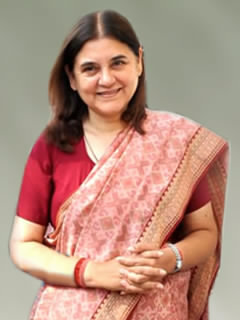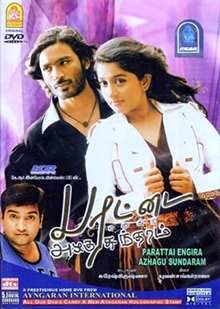
Jallikattu, also known as Eru Taḻuvuṭal and Manju-virattu, is a traditional event in which a zebu bull, such as the Pulikulam or Kangayam breeds, is released into a crowd of people, and many human participants attempt to grab the large hump on the bull's back with both arms and hang on to it while the bull attempts to escape. Participants hold the hump for as long as possible, attempting to bring the bull to a stop. In some cases, participants must ride long enough to remove flags on the bull's horns.

Maneka Gandhi is an Indian politician, animal rights activist and environmentalist. She was a member of the Lok Sabha, the lower house of the Indian parliament and a member of the Bharatiya Janata Party (BJP). She is the widow of Indian politician Sanjay Gandhi. She has been a minister in four governments, most recently in Narendra Modi's government from May 2014 to May 2019.

Navya Nair is an Indian actress who has appeared predominantly in Malayalam cinema along with a few Kannada and Tamil language films.

Usha Iyer Uthup is an Indian pop, filmi, jazz, and playback singer during the late 1960s, 1970s and 1980s.

Rukmini Devi Arundale was an Indian theosophist, dancer and choreographer of the Indian classical dance form of Bharatanatyam, and an activist for animal welfare.
The Animal Welfare Board of India (AWBI), headquartered at Ballabhgarh in Haryana state, is a statutory advisory body advising the Government of India's Ministry of Fisheries, Animal Husbandry and Dairying. The AWBI headquarters were previously situated in Chennai.

Udaya Chandrika, better known by her screen name Radha is a former Indian actress, who predominantly appeared in Tamil and Telugu films in addition to a few Malayalam, Kannada and Hindi films. She was one of the top heroines in the film industry for about a decade, from 1981 to 1991, dominating the 1980s era.

Parattai Engira Azhagu Sundaram is a 2007 Indian Tamil-language crime action film directed by Suresh Krissna. The film stars Dhanush, Meera Jasmine and Archana. It is a remake of the 2005 Kannada film Jogi. It revolves around a woman who comes to the city from her village in search of her presumably lost son. The film was released on 27 April 2007 and it could not repeat the success of its original version and was declared a box-office bomb.
Captain V. Sundaram was an Indian pilot and animal welfare activist. He founded the Blue Cross of India, the largest animal welfare organization of Asia.
The Blue Cross of India (BCI) is an animal welfare charity based in Chennai, India. It was established in 1959 by Captain V. Sundaram, his wife Usha and their three children, in Chennai. The society was formally registered in 1964 under the Societies Registration Act. The nine signatories to the Articles and Memorandum of Association were Captain V. Sundaram, Usha Sundaram, S. Chinny Krishna, Suresh Sundaram, S. Vijayalakshmi, D. Daivasigamony, Kamakshi Krishnamoorthi, Sundari Nataraj and T. V. Chandrasekhar. It is now one of the country's largest animal welfare organisations. It runs several animal welfare programs including animal rights awareness.

Bharath Srinivasan, known professionally as Bharath, is an Indian actor, who works predominantly in Tamil cinema, along with few films in Malayalam, Hindi and Telugu.

Talakadu Srinivasaiah Nagabharana, commonly known as T. S. Nagabharana, is an Indian film director, in the Kannada film industry and a pioneer of parallel cinema. He is one of the few film directors to have straddled the mainstream and parallel cinema worlds.

Rima Kallingal is an Indian actress and film producer who mainly works in Malayalam cinema. She made her film debut with Ritu (2009). She has been married to the Malayalam film director Aashiq Abu since 2013.

Tiruchengodu Ramalingam Sundaram Mudaliar was an Indian actor, director, and producer. He was the founder of the Salem-based film production company Modern Theatres.
Rajamani Velraj is an Indian cinematographer, director and writer who primarily works in Tamil and Hindi cinema. He is well known for his camera work in films like Asuran, Aadukalam, Vada Chennai, Kadaikutty Singam and Komban, and for directing Velaiilla Pattadhari and Thanga Magan.
Animal welfare and rights in India regards the treatment of and laws concerning non-human animals in India. It is distinct from animal conservation in India.

Rashmika Mandanna is an Indian actress who predominantly works in Telugu, Kannada and Hindi films. She has received four SIIMA Awards and a Filmfare Award. One of South India's highest-paid actresses, she was featured in Forbes India's 2024 list of "30 Under 30".

The 2017 pro-jallikattu protests, also known as the pro-jallikattu movement, were leaderless apolitical youth protests which took place in January 2017 in large groups in several locations across the Indian state of Tamil Nadu. Some sporadic smaller protests also took place across India as well as overseas. The chief motivation of the protest was against the Supreme Court's order to ban jallikattu, a traditional Tamil bull taming sport, which is held during Pongal, a harvest festival in the state of Tamil Nadu, India. The sport is conducted annually on the second day of the Tamil month Thai. The sport was banned by the Supreme Court in a decision citing cruelty to animals based on a lawsuit filed by the animal rights group People for the Ethical Treatment of Animals (PETA), which asserted that it violates the Prevention of Cruelty to Animals Act (PCA).

Usha Sundaram was an Indian pilot and animal rights activist. She was the first female pilot of post-independence India.

Varun Sunil is an Indian percussionist, singer, music producer and founder of Masala Coffee, one of the popular contemporary folk bands in South India. He is also well known for his musical contributions in Telugu, Tamil, Bollywood and Malayalam movie industries. He has performed alongside Vishwa Mohan Bhatt, Hariharan, T. H. Vinayakram, Ranjit Barot, Fazal Qureshi and many more.















